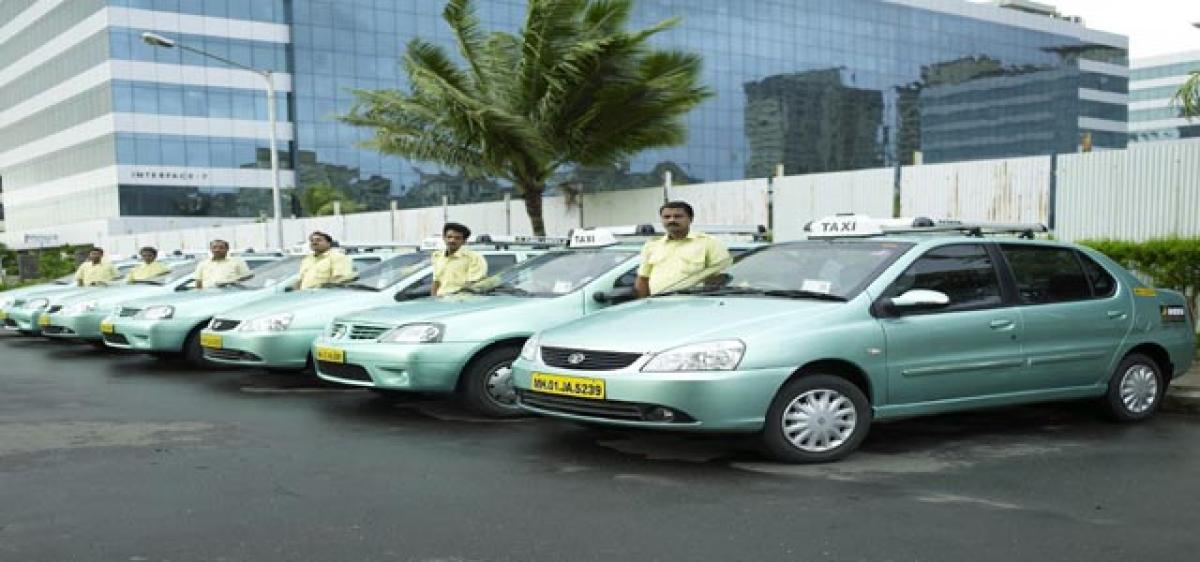Live
- Chanchalguda Jail Officials Say They Haven't Received Bail Papers Yet, Allu Arjun May Stay in Jail Tonight
- BJP leaders present evidence of illegal voters in Delhi, urge EC for swift action
- Exams will not be cancelled: BPSC chairman
- Nagesh Trophy: Karnataka, T.N win in Group A; Bihar, Rajasthan triumph in Group B
- YS Jagan condemns the arrest of Allu Arjun
- Economic and digital corridors to maritime connectivity, India and Italy building vision for future, says Italian Ambassador
- SMAT 2024: Patidar's heroics guide Madhya Pradesh to final after 13 years
- CCPA issues notices to 17 entities for violating direct selling rules
- Mamata expresses satisfaction over speedy conviction in minor girl rape-murder case
- Transparent Survey Process for Indiramma Housing Scheme Directed by District Collector
Just In

Hyderabad: With an aim to promote and regulate the urban transport, the Ministry of Road Transport and Highways (MoRTH) has released a draft taxi policy for regulating the taxis industry, including online booking apps or taxi aggregator.
Hyderabad: With an aim to promote and regulate the urban transport, the Ministry of Road Transport and Highways (MoRTH) has released a draft taxi policy for regulating the taxis industry, including online booking apps or taxi aggregator.
According to senior officials in the Transport Department, the aim was to promote urban mobility. Earlier, MoRTH had issued the guidelines ‘Licensing, Compliance and Liability of On-demand information technology based transportation aggregator operating within the jurisdiction of India’ for the regulation of third-party App in October 2015.
These guidelines are not binding on the States but can be used to prepare their own guidelines.
However, based on the Delhi High Court's advice, the Ministry constituted a committee under the chairmanship of the Secretary (Road Transport & Highways) in May 2016 and invited members from different State governments, Niti Aayog, Ministry of Information and Technology, Central Pollution Control Board and Delhi Traffic Police.
A senior official said there are currently four different taxi permits - City Taxi, All India Tourist, and Radio Taxi and Rent a Cab.
The new policy is aimed to bring aggregators, radio taxi operators and traditional city taxis under a uniform, fair and transparent regulatory framework, the official said.
City taxi permits would continue to work as per existing framework without any restriction on the numbers of vehicles. Taxis with all India permit may be allowed to ply for all purposes (both tourist and non-tourist purposes), except as street hailing taxis (reserved for city taxis).
However, these vehicles should comply with the fuel requirements specified by the Transport Department in different
categories.
State Transport Department can issue license to aggregator. The policy allows 90 days grace period to existing operators to register themselves. New Policy has proposed two categories of taxis - Economy (below 4 meters length) and Deluxe (above 4
meters length).
This rationale is based on the criterion set by the Finance Ministry for identifying cars for lower excise duty rates and the fact that over 87 per cent of the cars are less than 4 metres length.
There should be no restrictions on the choice of the operator or aggregators with regard to composition of the fleet, i.e. deluxe and economy.
The fare of Economy taxis can be regaled by State Transport Department. The department can set minimums as well as maximum fares charged by the aggregators.
While fixing the tariffs, the States may engage the services of transport economists and related experts who are be able to provide a scientific approach to determination of tariffs and permit charges.
The draft states that the tariffs of Deluxe Taxis should not be regulated and be allowed to be determined by market dynamics.
The operators can now use mobile fare application rather than electronic fare meter. The maximum tariff is permitted up to three times the minimum tariff.
To increase the availability of taxis during the night time, maximum tariff is allowed up to four times that of minimum tariff from 12 midnight to 5 am in morning.
The draft also talks about the working hours for the drivers. As per the Motor Vehicles Workers Act, 1961 the driver cannot operate more than 48 hours in a week. However, presently the drivers are working for 12-16 hours a day in a 7-day week.

© 2024 Hyderabad Media House Limited/The Hans India. All rights reserved. Powered by hocalwire.com







